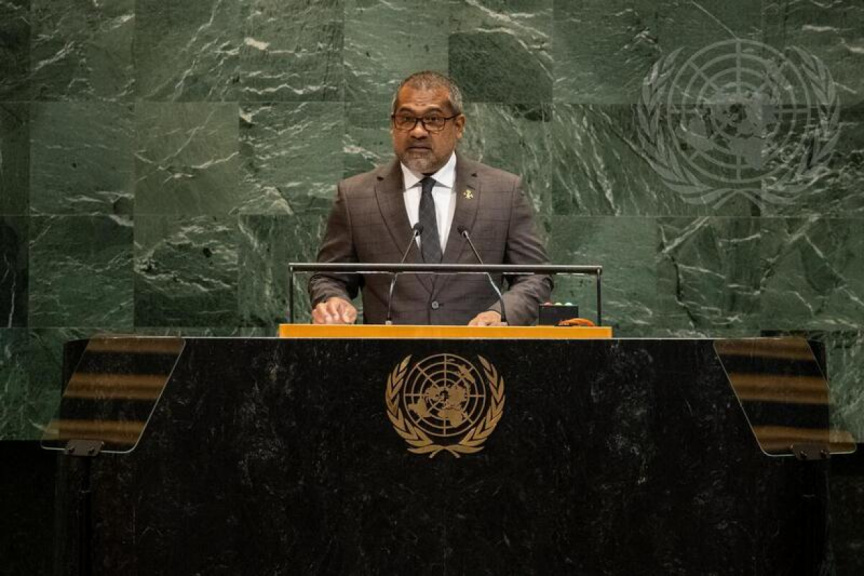
Maldivian Foreign Minister Dr. Abdulla Khaleel addresses the 80th UNGA on September 27, 2025. (Photo/UN)
Maldivian Foreign Minister Dr. Abdulla Khaleel called out countries for their complicity in Israel’s ongoing genocide in Gaza in his address at the United Nations General Assembly on Saturday, describing it as “the shame of the century.”
Khaleel delivered the Maldives’ statement in the fifth day of speeches at the 80th UNGA underway at the UN headquarters in New York, a day after he joined other delegates in a mass walkout in protest of Israeli Prime Minister Benjamin Netanyahu’s speech.
Erosion of public order
Starting his address, Khaleel said the Maldives has always placed its confidence in the UN and the multilateral system it represents – confidence that he said rests on the conviction that “laws restrain might, and rules hold firm against coercion.”
But he warned that when rules-based order is breached without accountability, the world loses more than order; it loses faith in the system itself.
“And when faith collapses, it is not peace that fills the void. It is unrestrained might: power that redraws boundaries, silences voices, and tramples norms,” he said.
Khaleel said that the world now faces three fault lines in the global order; the taboo against conquest, respect for sovereignty and territorial integrity, and multilateralism.
“For many decades, the rule that borders cannot be changed by force underwrote peace. That foundation is cracking. Every breach, once allowed, becomes precedent. And precedent invites repetition. Second, respect for sovereignty and territorial integrity. These are not slogans, but the ground rules for peace, development, and dignity. But today, powerful aggressors treat them as optional. Third, multilateralism—the doctrine that shared challenges require shared solutions. That doctrine is under siege. When institutions are bypassed, when vetoes paralyze, when laws are applied selectively, confidence unravels—and with it, the system itself,” he said.
‘Shame of the century’
Khaleel said that this erosion of global order is evident everywhere, especially in Palestine: in Gaza, where Israel’s ongoing genocide has killed more than 66,000 people many of them women and children, and in the occupied West Bank, where settler violence has increased as Israel builds more illegal settlements.
Khaleel said that Israel has “willfully, shamelessly, and repeatedly” violated international law, defied hundreds of resolutions of the UN Security Council and the UNGA, and rejected decisions of the International Court of Justice (ICJ) and sanctioned the International Criminal Court (ICC).
“People killed while begging for food. Mothers holding lifeless babies. Children staring blankly at the ruins of their homes and their futures. These are the images that you simply cannot forget and move past.”
He called out countries for their hypocrisy and complicity in the ongoing genocide by continuing to supply Israel with money and weapons.
“And the sheer hypocrisy is…This genocide is sustained by weapons and money from the very countries that claim to defend human rights—the same countries that helped define the very norms and laws being broken,” he said. “By their actions, they refuse to see Palestinians as equal human beings, deserving of life, dignity, and freedom. This complicity is the shame of the century.”
He said that the assault on sovereignty is equally clear in Israel’s recent attacks against Qatar, Syria, Lebanon, Yemen, Tunisia, and Iran.
“Each strike is a reminder that borders are trampled when power speaks louder than law. In each case, where laws and norms give way to leverage; where responsibility gives way to convenience: the pattern is the same. If this erosion continues, the question will no longer be whether it will happen again, but who will be the next victim,” he said.
Appeals for urgent reform of UN
Khaleel said that the UN, especially its most powerful arm, the UN Security Council, needs urgent reforms.
He reiterated Maldives’ call for a more expanded and representative Security Council, with no veto powers and a rotating seat for Small Island Developing States (SIDS).
“We need a Council that is transparent in its deliberations and accountable in its decisions to the membership and to itself. We need a Council that does not hide under the threat of veto,” he said.
Khaleel said the UN Secretary-General António Guterres’ three-track reform should be member state–led, member-state driven, and implementation-focused.
He said that the UN should enhance its presence – especially in SIDS, align mandates and secure predictable development finance, and ensure sufficient program delivery staff.
“Reform is not only about structures; it is about credibility. And credibility lives or dies with trust in multilateralism,” he said.
“If the UN cannot act to prevent, to protect, and to provide… trust in multilateralism will continue to erode. UN80 must repair the guardrails before they fail beyond repair.”